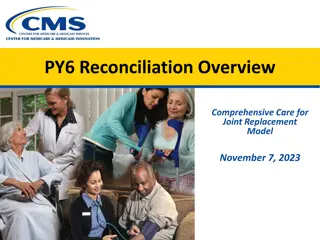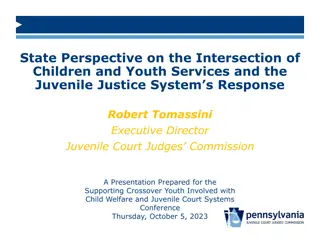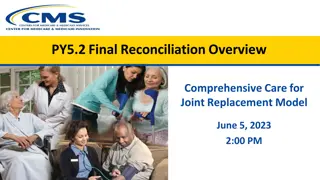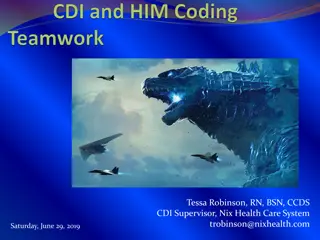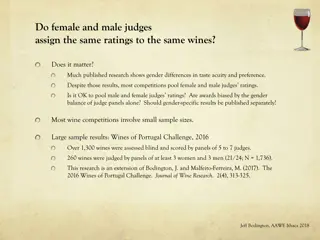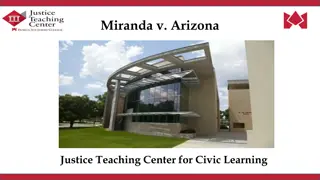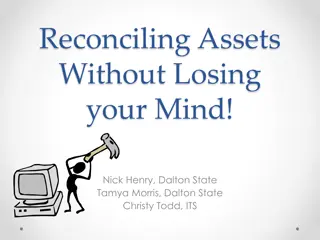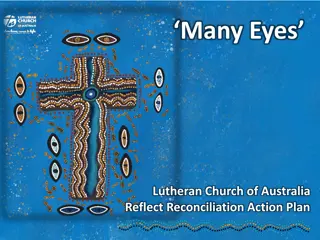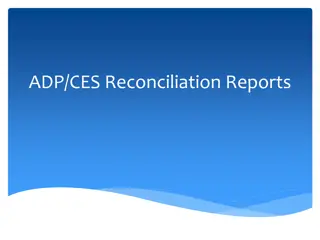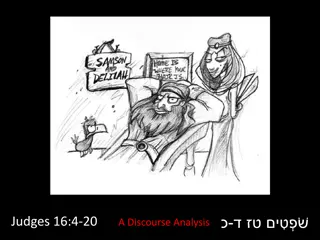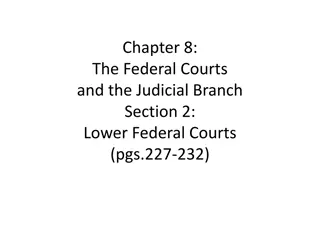Analysis of Judges 19: A Tale of Contrasts and Reconciliation
Judges 19 narrates a story of contrasts and reconciliation involving a Levite and his concubine. The narrative showcases a conscious contrast to the preceding story, highlighting the Levite's journey to recover his concubine from the south. As the story unfolds, themes of patience, respect, and positive character portrayals emerge, leading to a deeper understanding of the characters' perspectives and actions.
Download Presentation

Please find below an Image/Link to download the presentation.
The content on the website is provided AS IS for your information and personal use only. It may not be sold, licensed, or shared on other websites without obtaining consent from the author. Download presentation by click this link. If you encounter any issues during the download, it is possible that the publisher has removed the file from their server.
E N D
Presentation Transcript
Judges 19:1 [Anchor] a man, a Levite. Conscious contrast (narrative inversion) to the preceding story of a young Levite (18:3). This one resides in the north and acquires a concubine from the south, a partial antithesis of Micah s priest (17:7 12). Judges 17:7-8 Judges 18:3
Judges 19:1 [Anchor] a man, a Levite. Conscious contrast (narrative inversion) to the preceding story of a young Levite (18:3). This one resides in the north and acquires a concubine from the south, a partial antithesis of Micah s priest (17:7 12). Judges 17:7-8 Judges 18:3
Judges 19:2 [NET] 5 tn Or "was unfaithful to him." Many have understood the Hebrew verb being from ) zanah, "to be a prostitute"(, but it may be derived from a root meaning "to be angry; to hate" attested in Akkadian )see HALOT 275 s.v. II vattizneh( as ) . ( [NAC] The text does not explicitly blame either the man or the woman for this falling out. But in light of the Levite s later conduct and the narrator s portrayal of men in the book as a whole, his sympathies seem to lie with the concubine, though this is not apparent at the outset. In any case, her father accepts her back home. At the same time it should be noted that the quarrel was not so intense that a full reconciliation was precluded. On the contrary, when the Levite arrives at his father-in-law s house, both the young girl and her father receive him gladly.
Judges 19:3 [Anchor] The Levite s concern to recover his concubine suggests that she, not he, is the offended party. That he will seek a reconciliation elicits the reader s respect for the Levite at the outset of the story. [NAC] The man seems to have waited patiently for her to return, but he waited in vain. Finally, after four months he takes the initiative and heads for Bethlehem himself to fetch her. In the account of the encounter with his father-in-law and the reconciliation, every one of the characters is painted in a positive light. Taking with him a servant and a pair of donkeys, the Levite s aim is to persuade his concubine to return with him.
Judges 19:4 [Anchor] The double identification at the outset is necessary because of the ambiguity of unpointed h tn which may be either father in-law or son in-law.
People - Humanity People - Family 1 1 1 1 2 1 1 people, humankind (545x) people, humankind (42x) man, husband (2187x) woman, wife (781x) male (82x) female (22x) man, young man, male (66x) lady, queen, mistress (15x) lord, master, warrior (160x) young man (44x) virgin (50x) adolescence (10x) young man (2x) young woman (9x) youth (5x) young child, tender plant (12x) boy, child, youth (90x) girl, damsel (3x) childhood, youth (3x) boy, youth (240x) girl (76x) youth (46x) children (41x) father (1210x) mother (220x) son, grandson (4942x) daughter, granddaughter (588x) brother, relative, countryman (629x) sister (119x) beloved, uncle (61x) aunt (3x) father-in-law (4x) mother-in-law (11x) son-in-law, bridegroom (20x) daughter-in-law, bride (34x) male relative by marriage (21x) female relative by marriage (1x) master, husband (84x) flesh, relative (16x) 1 1 1 "an ostensibly reputable young girl who is past puberty and is, by default at least, still in the household of her father" (NIDOTTE, Vol. 1, p. 767) (concerns social status) young woman (concerns fertility and childbearing potential) A girl ceases to be a when she becomes a wife; she ceases to be an when she becomes a mother. (NIDOTTE, Vol. 1, p. 769) A woman ceases to be an when she becomes a mother not when she becomes a wife or a sexual partner. (NIDOTTE, Vol. 3, p. 415) Behold, the shall conceive and bear a son (Isa 7:14)
Judges 19:4 [NAC] As for the Levite s father-in-law, he too rejoices at the arrival of his son-in-law. Why he was so happy we may only speculate. Was he tired of having his daughter back and anxious to recover his empty nest status? Or was he simply overjoyed at the reconciliation between his daughter and her husband. In any case, by the end of v. 4 the reconciliation seems complete. The tension expressed in vv. 1 2 has been resolved, and the story seems to have arrived at a happy conclusion. All that remains is for the Levite and his concubine to return home. [Anchor] This unit with its concentration upon the father in-law likewise emphasizes his orthodox behavior. The father will be enormously relieved to see the young woman off with her husband once again. But his lavish hospitality in the meantime will create a new crisis. At the same time emphasis upon his position as father of the young woman prepares for a sharp contrast with the way another one will rise to the occasion amidst lavish hospitality, in vs. 24. In all of the dealings between the Levite and his father in-law the question of original grounds for the young woman s anger and her flight home, indeed all interest in the young woman herself, gets lost in the shuffle.
Judges 19:11-13 Why the second when it is the same speaker?
Judges 19:11-13 Why the second when it is the same speaker? Perhaps because some time has passed(?). [NAC] In typical Hebrew narrative style the events of the journey are telescoped into a couple of verses. Although vv. 11 13 have the appearance of a single conversation, the comments of v. 13 were obviously made some hours after v. 12.
Judges 19:14-15 Here we see the social outrage of the residents of Gibeah of Benjamin. In verses 22ff we ll see the moral outrage of the residents of Gibeah of Benjamin. [NAC] The last clause in v. 15 would have been shocking anywhere in the ancient Near East. But it is especially shocking in Israel. The social disintegration has infected the very heart of the community. People refuse to open their doors to strangers passing through. It makes no difference that these travelers are their own countrymen.
Judges 19:18-19 [NAC footnote] The NIV s house of the LORD follows the MT s , along with Tg, Syr, and Vg, even though this makes no sense in the context. The LXX s , and to my house, suits the context better. So most modern translations )NASB, RSV, NRSV, NEB, REB, GNB, JPSV(. It is conceivable the Levite s itinerary would have involved a visit to the central shrine at Shiloh, but in this book this place is called the house of God ) , 18:31(. Presumably the MT, which provides the base for most ancient versions, mistook consonantal , my house, for an abbreviation of . For a discussion see E. Tov, Textual Criticism, 256 57; O Connell, Rhetoric of the Book of Judges, 483.
Judges 19:18-19 [NAC] After complaining in v. 18b that no one in Gibeah will offer lodging for the night, the Levite expands on the seriousness of Gibeah s social dysfunction. He and his party are asking only for a bed. Since they have brought food and wine for themselves and fodder for their donkeys, they are not even expecting an evening meal. With his comment the Levite verbalizes the social malignancy in Israel. The mores of the nation have been infected at the most fundamental level the people of one tribe sense no obligation to the members of another. There is no sense of community.
Genesis 19:4-8 Judges 19:22-24
Genesis 19:4-8 Judges 19:22-24 [NAC] The narrator follows Gen 19:5, 8 in deliberately using an ambiguous term y da , to know. Under normal circumstances, where the proper standards of hospitality would be operative, the expression could reflect a positive desire to get to know a new person in town, to establish social relations with the person. But here as elsewhere the verb serves euphemistically for to engage in sex. (Cf. Gen 4:1; 19:5, 8; Num 31:17; 1 Kgs 1:4.) Although they later concede to receive a woman, the fact that they ask for the man betrays their homosexual orientation. Accordingly, their demand represents a violation of three fundamental social/moral laws: the law of hospitality, the proscription on intercourse outside of marriage, and proscription on heterosexual intercourse.
[NAC] There are actually two dimensions to the crime intended by the men of Gibeah. First, their action is n b l because it violates sexual norms. These men have come to commit a perverse homosexual act.243 Second, their action is n b l because it violates customary norms of hospitality.244 243 The disposition of the Torah toward male homosexual acts is explicitly declared in Lev 18:22; 20:13. In the sight of God this is a capital crime to be punished by execution. 244 Cf. the application of the word to the violation of the customs of holy war (Josh 7:15) and to paying tribute (1 Sam 25:25).
[NAC] As intimated earlier, the narrator places great emphasis on the timing of events in this chapter. The stage for this tragic sequence of incidents was set in v. 10, when the Levite had finally extricated himself from his father-in-law. But he had no idea how dark the coming night would be. The narrator keeps the reader s attention on the timing of episodes with repeated chronological references that beat ominously throughout the narrative. )1( When the day had withered/collapses to setting and at the decline of the day, the Levite decides to leave )v. 9(. )2( When the day had gone down, he was faced with the reality that he would not make it home, hence the need to find a place to spend the night (v. 11). (3) Refusing to seek the hospitality of the Jebusites, as the sun was setting the Levite and his companions arrive at the outskirts of Gibeah, which should provide a safe haven )v. 14(. )4( At evening the old man who would be his host arrives and invites them to his house (v. 16). (5) The plot reaches its nadir when the wicked men of the city rape and torture the Levite s concubine all night )v. 25(. )6( The addition of until the morning in v. 25b invites the reader to await a new day, but this is a ruse. The horrors have not yet ceased. )7( At dawn )ha h ar) the mob discards her (v. 25c). )8( At the turn of the morning the pitiful victim collapses on the doorstep of the host s house )v. 26a(. )9( There she remains until the light )v. 26b(. With these chronological notes the narrator has given his verdict on the spiritual and moral state of Israel. The light of the knowledge of Yahweh and doing what is right in his [Yahweh s] eyes have been eclipsed by the depravity of the human soul expressed in doing what is good in one s own eyes. Block, D. I. (1999). Judges, Ruth (Vol. 6, pp. 539 540). Nashville: Broadman & Holman Publishers.
Judges 19:30 [NET Bible] 66 tc Codex Alexandrinus (A) of the (original) LXX has the following additional words: "And he instructed the men whom he sent out, 'Thus you will say to every male Israelite: "There has never been anything like this from the day the Israelites left Egypt till the present day."'"
The evidence of his skill is there to be seen in the compounded dramatic ironies. It is the hospitable and courteous urgings of the Levite s father in-law [Judg, p. 278] which cause the delay in departure that prevents the party from reaching the safety of Ephraim by nightfall. The servant s advice to stop for the night in Jebus (a city outside the Israelite alliance) would if followed have averted the calamity. The disgraceful lack of hospitality by the Benjaminites is repaired through the offer of possibly the one man in town the sanctity of whose hearth and board is not protected by fear of reprisal through blood-kinship and political ties within the city. (S. D. Currie, Biblical Studies for a Seminar on Sexuality and the Human Community, Austin Seminary Bulletin 87 [1971], 14.) Robert G. Boling, JUDGES (The Anchor Yale Bible; New Haven: Yale University Press, 1974), 277-278.




